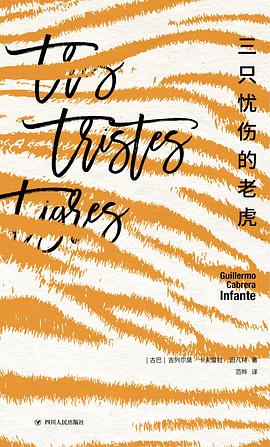WULOLIFE
《三只忧伤的老虎》作者: [古巴] 吉列尔莫·卡夫雷拉·因凡特 出版社: 四川人民出版社
《三只忧伤的老虎》作者: [古巴] 吉列尔莫·卡夫雷拉·因凡特 出版社: 四川人民出版社
Couldn't load pickup availability
Description
内容简介 · · · · · ·
本书是古巴作家因凡特的代表作,是拉美“文学爆炸”风潮中最独特、最具实验性的作品之一。这本小说没有明确的故事线,开篇的场景是50年代哈瓦那最著名的夜店,一干人物纷纷亮相。而全书结构与此呼应,不同人物上场、下场,以其独特的视角和声音呈现一段“炫目的演出。小说描写了50年代末哈瓦那的几位艺术家,但真正的主角并不是他们,而是文学、电影、音乐以及回忆中的城市本身。
本书书名源自西语中一句家喻户晓的绕口令,整部作充满大量语言游戏、已成为20世纪文学史上的“少数派”经典。地位毫不逊色于马尔克斯同年出版的《百年孤独》,被誉为拉美的《尤利西斯》、哈瓦那夜店版的《追忆逝水年华》。
---------------
·古巴作家卡夫雷拉·因凡特是拉美“文学爆炸”中的一颗巨星,曾获得西语文学的最高奖项塞万提斯奖。
·本书是“文学爆炸”迟到的经典,地位毫不逊色于马尔克斯同年出版的《百年孤独》,被誉为拉美的《尤利西斯》、哈瓦那夜店版的《追忆逝水年华》。
·全书充斥着大量的语言游戏(俚语、笑话、谐音、双关)、文体实验(戏仿、拼贴、互文),以及形式设计(比如在文字中夹杂图示,篇章中加入黑页或白页,整页文字丰富的巧思与绝佳的幽默感。
· Please note:中文版为半个多世纪以来首次引进,由《百年孤独》译者历时八年完成。
----------------
凭借《三只忧伤的老虎》,卡夫雷拉·因凡特跻身拉丁美洲小说家的前列。这本书可与科塔萨尔的《跳房子》、加西亚·马尔克斯的《百年孤独》和多诺索的《污秽的夜鸟》媲美。——《纽约书评》
《三只忧伤的老虎》是一本了不起的书。我怀疑自《堂吉诃德》以来,还没有一本更有趣的西班牙语书…
以来用西班牙语写的最好玩的书。现代西班牙语文学中最具原创性的声音之一。——《卫报》
一首对孤寂的夜晚、对哈瓦那的炎热、对街头俚语的赞歌。——《西班牙自由数字报》
这部小说改变了西班牙-美国文学的生态。 ——《西班牙国家报》
文字游戏的大师和记忆的守护者。他把哈瓦那变成了古巴的一个隐喻。——《古巴聚会》
《三只忧伤的老虎》是最激动人心/最性感/最有趣/最吵闹/最有想象力/最令人回味的萨尔曼·拉什迪
为了实现调侃、滑稽模仿、一语双关、智力的高难度杂技以及口语中的跳跃,卡夫雷拉·因凡特总是准备着与全世界人为敌,准备失去朋友甚或自己的生命。因为幽用来放松头脑的解闷,毋宁说,它是一种被迫的、向现存世界发起挑战的手段。——巴尔加斯·略萨
纳博科夫、贝克特和卡夫雷拉·因凡特总能带给我们这样的惊喜。——苏珊·桑塔格
一本由健谈的人写给健谈的之中逐渐消失。 ——莫里斯·那多,文学评论家,法国最佳外国小说奖评委
